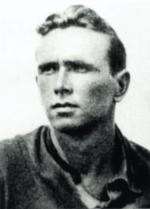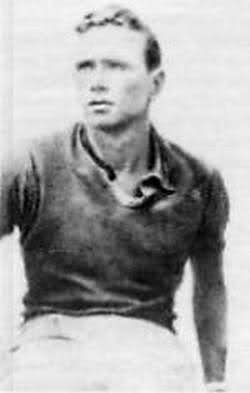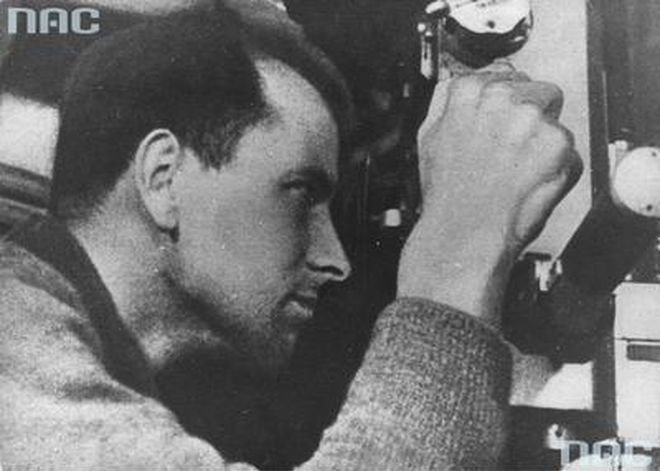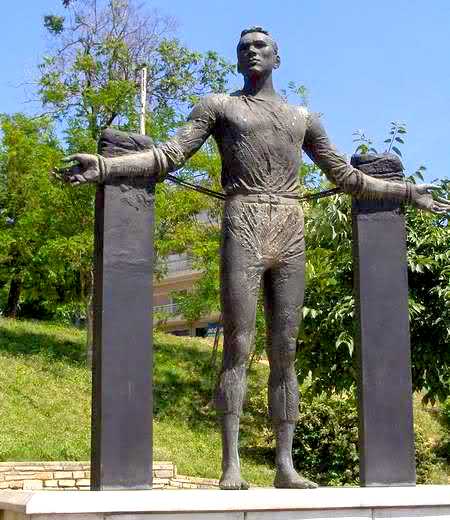Jerzy Szajnowicz-Iwanow (pronounced: Ivanov): Polish man in the English service – the hero of the Greek resistance movement
A misty autumn night falls at the Aegean Sea. At Greek banks near Marathon a British submarine emerges to the surface after a week of sailing from Alexandria. „Thunderbolt” has a few mysterious passengers on her board. A blue-eyed blond man of an athletic build goes down as first to a rubber boat moored alongside the boat side, carrying a little soldered can tin in which there is a hidden radio transmitter. He does not look Greek. But he once confided in commander Crouch – the commander of the ship – that he felt like at home there. Earlier, the commander had been told by one of the heads of intelligence in Egypt that he was his most important passenger – „agent number one to the Balkans”.
The boat of „Thunderbolt” comes to the shore after midnight. Later that same evening, „agent number one”, from now on Nikolaus Tsenoglu, arrives in Athens. Soon a dangerous explosion at the Peloponnesian railway happens. Among the passengers is also Mr Tsenoglu from Crete. He is carefully watching the damaged engine. English „cardiff”, a piece of artificial coal with an explosive thrown into a coal carriage, blew the firebox. Within less than a year from now the English „agent number one” was to become the most dangerous enemy of the Axis countries in the Balkans and the hero of the Greek resistance movement. Allied commanders admitted after the war that his activity ”was equivalent to the combat actions of divisions „.
From Wiki:
Jerzy Iwanow-Szajnowicz, properly Jerzy Iwanow (born on December 14th, 1911, died on 4th January 1943 in Athens) – Polish scout, athlete, during World War II an agent of British and Polish special services and hero of the Greek resistance movement.
He was the son of Russian Colonel Vladimir Iwanow and Leonarda Szajnowicz from Warsaw. He was born in Warsaw, Poland. When he was a few years old, his mother remarried a Greek Jannis Lambrianidis and moved to Thessaloniki where young Iwanow moved to live in 1925. He passed his secondary school exams in the Secondary Comprehensive School of French Secular Mission in 1933, and in 1938 he graduated from the Catholic University of Louvain (Belgium) – with a Master of Science degree in agricultural sciences. In August 1939 he was granted a diploma of the Institut d’Agronomie de la France d’Outre-Mer. He was a polyglot, apart from the Polish language he excellently mastered English, Russian, French, German and Greek. He was a remarkable swimmer [1] (a representative of Poland in water polo).
He was in Greece when World War II broke out. In May 1940, he began working with Polish military outpost in Thessaloniki. From April 1941 he stayed in Palestine. He expected to be sent to the Carpathian Brigade, but was eventually seconded to the disposal of the British troops. As a man of the British Special Operations Executive Unit No.004 in Cairo, he became an agent of British intelligence. After training in Alexandria he was transported (under the code name of „033 B”) aboard the British submarine „Thunderbolt” to Greece in October 1941.
In cooperation with the Greek resistance movement he led espionage and sabotage activity. He passed information on to the English commanders about German military installations in Greece, movements of German and Italian troops, convoys sent to North Africa. In March 1942, under the guise of a Greek port worker in the team of Skaramanga yard, he got inside the U-boat U-133 and sank it with magnetic mines. In the following months he became famous for his next brave diversionary actions, for example, sending down a few ships in the Piraeus and some further in Pharos, as well as installing a magnetic bomb on U-boat U-372 in Corinth (the ship was forced to emerge onto the surface in the waters of the Levant and then was destroyed by the British navy). Iwanow’s group destroyed or damaged 400 German and Italian aircraft in the Malziniotti plants in New Faleron (a district of Athens).
Iwanov-Szajnowicz was caught three times by the Gestapo. However, ha managed to escape twice. On September 8th, 1942, he was recognised and betrayed by a friend, and then was arrested in Athens for the third time. On December 2nd he got a triple sentence to death by the German court. He died on January 4th, 1943, hurt by an SS man while trying to escape from the place of execution – a military shooting range in Kesariani – a district of Athens, then executed, along with other convicts.
Iwanow-Szajnowicz was posthumously awarded the Order of Military Virtue. In July 1945 Marshal Harold Alexander announced thanks to Iwanov on behalf of the Allied Nations, and in a few years after Iwanow’s death Queen Elizabeth II donated £ 1,000 to his family in recognition of his achievements.
The literary work protagonist of the biographical novel by Stanisław Strumph-Wojtkiewicz “Agent Nr.1″, and 1971 film – a drama thriller – was made in Poland on the basis of the events of Iwanow-Szajnowicz’s espionage and sabotage activity in Greece, under the title “Agent nr 1″ directed by Zbigniew Kuźmiński with Karol Strasburger in the lead role.
100 years ago Jerzy Iwanow-Szajnowicz – a Polish super agent – was born
100 years ago – Jerzy Iwanow-Szajnowicz was born on 14th of December in 1911 in Warsaw. During World War II he was a 033B agent of British intelligence. He became famous for blowing up German ships and supply vessels. His statue stands in Thessaloniki.
Jerzy Iwanow-Szajnowicz was the son of a Russian man and a Polish woman. A few years later his mother broke up with his father and she went to Thessaloniki with her second husband, Greek businessman Jannis Lambrianidis. Jerzy remained in the country and started his education at a Catholic school of Marian Fathers. At the age of 14 he moved to Thessaloniki to his mother and was educated in a French high school. He also started training swimming and was soon successful. While studying agronomy in the Belgium Louvain, he became the Belgian Academic Champion in swimming.
He always came to the country on Summenr holidays where he soon became a member of the Warsaw AZS (Akademicki Związek Sportowy – the Academic Sports Association). He was the mainstay of the water polo with which he won the Polish championship in 1937. Later, as a player of the national team he represented the country in international competitions many times. After the outbreak of the war he began to work with Polish military mission in Thessaloniki helping Polish refugees.
After Germany occupied Greece, Iwanow-Szajnowicz forced his way through to the Independent Brigade of Carpathian Shooters training in Palestine. However, his Russian name to which he added his mother’s maiden name did not made a positive impression on the Poles.
The English, however, appreciated particularly his linguistic abilities (he knew six languages) and they sent him to training for intelligence agents to their centre in Alexandria. Soon after that, as the 033B he was transferred to Greece, officially as Kiriakos Paryssis with the task of elimination of sources of provision and military supply for Afrika Korps. He quickly organised a network of contacts among various professional groups and his colleagues conducted significant sabotage actions against Germans, among others causing aircraft accidents by throwing substances that changed the chemical composition of fuel or destroying train engines carrying weapon. Iwanow-Szajnowicz also passed on information to the the English about the position of German and Italian forces.
He often participated personally in the actions. As an excellent swimmer, he made even very long distances without specialised equipment in the night and placed magnetic mines onto hulls of German troops or onto ones with supply for the troops of the Third Reich.
In this way, he destroyed, among others, a German submarine and an Italian chaser. He often changed his identity. He had an enormous network of contacts and caused such great losses in the German forces that a high reward was offered for helping to catch him.
Tagged with: Jerzy Iwanow-Szajnowicz, Wielcy Polacy (Great Poles)
(Photo: NAC / NAC)




